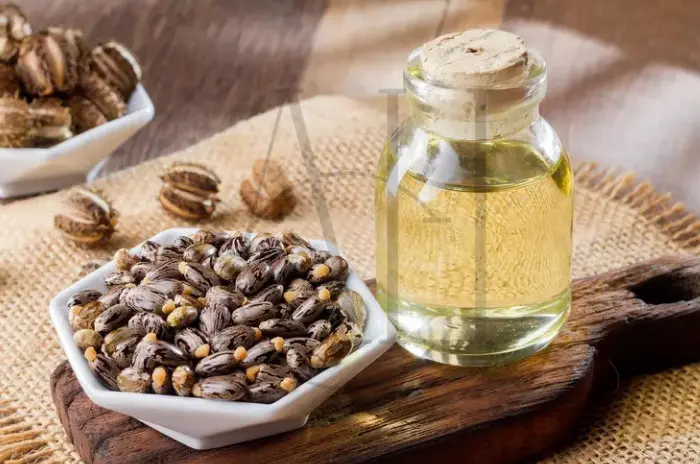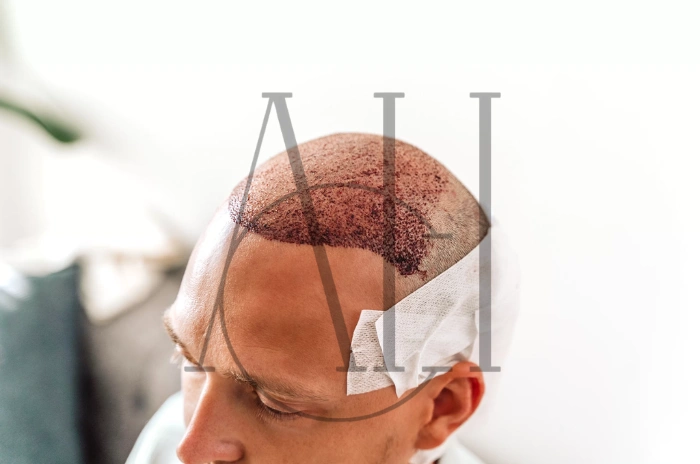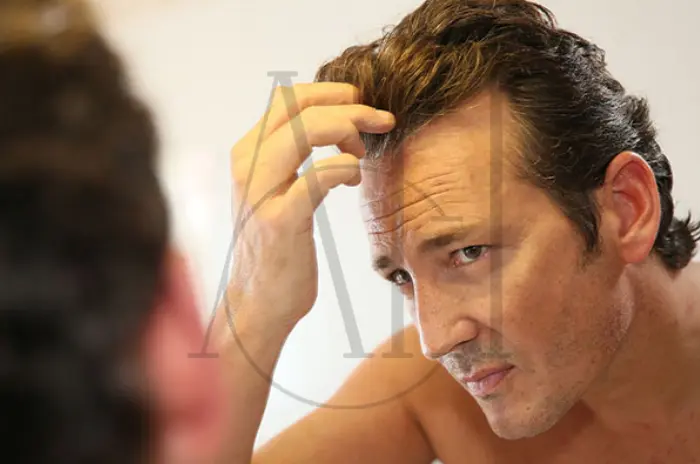Your hair reflects your overall health, and what you eat plays a crucial role in achieving strong, lustrous locks. A healthy hair diet isn’t just about using expensive shampoos or treatments – it starts from within. The nutrients you consume directly impact your hair’s strength, growth rate, and overall appearance.
Many people struggle with hair loss and thinning without realizing that their diet might be the missing piece of the puzzle. Essential nutrients like biotin, iron, protein, and omega-3 fatty acids work together to create the optimal environment for hair growth. When your body lacks these vital nutrients, your hair follicles can’t function properly, leading to weak, brittle strands and slower growth.
Understanding which foods support hair health can transform not just your hair, but your confidence too. From biotin-rich foods to antioxidant-rich foods for hair, this comprehensive guide will show you exactly how to nourish your hair from the inside out.
Table of Contents
ToggleThe Best Foods for Healthy Hair Growth
The foundation of any best diet for healthy hair lies in choosing nutrient-dense foods that provide essential building blocks for strong strands. These powerhouse foods deliver multiple nutrients that work synergistically to promote optimal hair health.
Eggs: Protein and Biotin in One
Eggs for hair growth are unmatched in their nutritional profile. Each egg contains high-quality protein, which forms the structural foundation of hair, along with significant amounts of biotin. This B-vitamin is crucial for producing keratin, the protein that makes up your hair shaft.
The protein in eggs provides all nine essential amino acids your hair follicles need to create strong, resilient strands. Additionally, eggs contain selenium and zinc, minerals that support scalp health and prevent hair loss. Including eggs in your daily routine can significantly impact your hair’s thickness and growth rate.
Spinach: Iron-Rich Green for Scalp Circulation
Spinach for hair growth offers an impressive array of nutrients in every leaf. This dark leafy green is packed with iron, which carries oxygen to your hair follicles, promoting healthy circulation and growth. Iron deficiency is one of the leading causes of hair loss, particularly in women.
Beyond iron, spinach provides vitamin A, vitamin C, and folate. These nutrients work together to produce sebum, your scalp’s natural conditioner, while also supporting the production of healthy hair cells. The antioxidant-rich foods for hair category includes spinach as a top performer.
Fatty Fish: Omega-3 and Vitamin D Source
Salmon, mackerel, and sardines are excellent sources of omega-3 fatty acids for hair health. These healthy fats nourish hair follicles from within, adding shine and reducing inflammation that can lead to hair loss. The anti-inflammatory properties of omega-3s help maintain a healthy scalp environment.
These fish also provide high-quality protein and vitamin D, a nutrient that’s often deficient in people experiencing hair thinning. Research shows that adequate vitamin D levels are essential for hair follicle cycling and new hair growth.
Sweet Potatoes: Rich in Beta-Carotene
Sweet potatoes are loaded with beta-carotene, which your body converts to vitamin A. This essential nutrient helps your scalp produce sebum, keeping your hair moisturized and healthy. Vitamin A deficiency can lead to dry, brittle hair and an itchy scalp.
The vitamin A in sweet potatoes also supports cell growth, including hair cells. However, balance is key – too much vitamin A can actually cause hair loss, so sweet potatoes provide a safe, natural source of this important nutrient.
Nuts and Seeds: Zinc, Vitamin E, and Fatty Acids
Almonds, walnuts, and pumpkin seeds are nutritional powerhouses for hair health. They provide zinc, an essential mineral for hair tissue growth and repair. Zinc and hair loss are closely connected – deficiency in this mineral can cause significant hair shedding.
These foods also contain vitamin E, a powerful antioxidant that protects hair follicles from oxidative stress. The healthy fats in nuts and seeds help your body absorb fat-soluble vitamins and provide essential fatty acids that keep hair soft and shiny.
Avocados: Packed with Healthy Fats and Antioxidants
Avocados for hair provide monounsaturated fats that nourish hair from within while supporting the absorption of other nutrients. They’re rich in vitamin E, which improves blood circulation to the scalp and helps repair damaged hair follicles.
The biotin content in avocados supports hair growth, while their natural oils can even be used topically as a hair mask. The combination of healthy fats and antioxidants makes avocados a must-have in any hair growth foods list.
Beans and Lentils: Plant-Based Protein Power
Legumes offer an excellent plant-based source of protein for healthy hair. They’re particularly rich in iron, zinc, and biotin – three nutrients that are crucial for preventing hair loss and promoting growth. For those following vegetarian diets, beans and lentils are essential for maintaining adequate protein levels.
The iron-rich foods for hair category includes various legumes that help prevent iron deficiency and hair loss. The complex carbohydrates in beans also provide steady energy for hair follicle activity.
Berries: Loaded with Vitamin C and Antioxidants
Berries for hair health offer some of the highest concentrations of vitamin C and antioxidants available in whole foods. Vitamin C is essential for collagen production, which strengthens hair and prevents breakage. It also helps your body absorb iron more effectively, supporting overall hair health.
The antioxidants in berries protect hair follicles from free radical damage, which can cause premature aging and hair loss. Blueberries, strawberries, and blackberries all contribute to a healthy scalp diet.
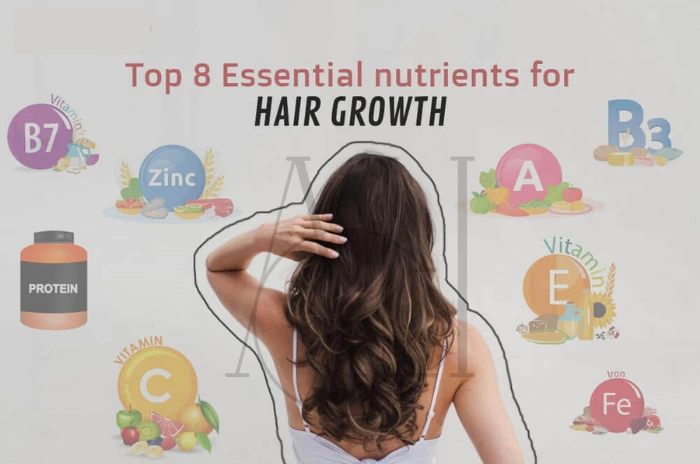
Key Nutrients Your Hair Needs
Understanding the specific nutrients required for optimal hair health helps you make informed dietary choices. Each nutrient plays a unique role in the hair growth cycle and overall hair quality.
| Nutrient | Function for Hair | Best Food Sources | Daily Recommended Amount |
|---|---|---|---|
| Protein | Building blocks of keratin | Eggs, fish, lean meat, beans | 0.8-1.2g per kg body weight |
| Iron | Oxygen transport to follicles | Spinach, red meat, lentils | 18mg (women), 8mg (men) |
| Biotin | Keratin production support | Eggs, nuts, sweet potatoes | 30-100 mcg |
| Zinc | Follicle repair and growth | Oysters, pumpkin seeds, beef | 8-11mg |
| Omega-3 | Scalp health and shine | Fatty fish, walnuts, chia seeds | 250-500mg EPA/DHA |
| Vitamin A | Sebum production | Sweet potatoes, carrots, spinach | 700-900 RAE |
| Vitamin C | Collagen synthesis | Berries, citrus fruits, peppers | 75-90mg |
| Vitamin D | Hair follicle cycling | Fatty fish, fortified foods | 600-800 IU |
| Vitamin E | Antioxidant protection | Nuts, seeds, avocados | 15mg |
Protein: The Building Block of Hair
Hair is approximately 95% protein, making adequate protein intake crucial for hair growth. Protein for healthy hair provides the amino acids necessary to produce keratin, the structural protein that gives hair its strength and elasticity.
When protein intake is insufficient, your body prioritizes other functions over hair growth, leading to thinning and weak strands. Adults should aim for 0.8-1.2 grams of protein per kilogram of body weight, with higher amounts needed during periods of stress or illness.
Iron: Preventing Hair Thinning and Shedding
Iron deficiency and hair loss are strongly linked, particularly in premenopausal women. Iron helps red blood cells carry oxygen to hair follicles, supporting their metabolic activities and growth processes. When iron levels drop, hair follicles can enter a resting phase prematurely.
Iron-rich foods for hair include lean meats, fish, beans, and dark leafy greens. Combining these foods with vitamin C sources enhances iron absorption, maximizing the benefits for your hair.
Biotin: Vital for Healthy Hair Texture
Biotin is perhaps the most well-known vitamin for hair health. This B-vitamin helps produce keratin and supports the metabolism of amino acids used in hair growth. Biotin-rich foods for hair include eggs, nuts, seeds, and sweet potatoes.
While true biotin deficiency is rare, many people benefit from ensuring adequate intake through food sources. Biotin-rich foods are generally more effective than supplements, as they provide additional nutrients that work synergistically.
Zinc: Supporting Hair Follicle Repair
Zinc and hair loss research shows that this mineral is essential for DNA and RNA production, protein synthesis, and cell division – all critical processes for hair growth. Zinc also helps regulate hormone levels that can affect hair health.
Zinc sources for hair include oysters, beef, pumpkin seeds, and lentils. The body doesn’t store zinc efficiently, so regular intake through food is important for maintaining healthy levels.
Omega-3 Fatty Acids: Nourishment from Within
Omega-3 fatty acids for hair provide anti-inflammatory benefits while nourishing hair follicles and adding natural shine. These essential fats cannot be produced by the body, making dietary sources crucial for hair health.
The best sources include fatty fish, walnuts, chia seeds, and flaxseeds. Regular consumption of omega-3s can reduce scalp inflammation and support the hair growth cycle.
Vitamin A and C: Scalp Health and Collagen Support
Vitamin A helps produce sebum, which keeps hair moisturized and healthy. However, balance is crucial – both deficiency and excess can cause hair loss. Vitamin C is essential for collagen production, which strengthens hair and improves its texture.
These vitamins also act as antioxidants, protecting hair follicles from damage. The best sources include colorful fruits and vegetables, which provide these nutrients in balanced amounts.
Vitamin D: A Deficiency Linked to Hair Loss
Research increasingly shows connections between vitamin D deficiency and various types of hair loss. This vitamin helps create new hair follicles and supports the hair growth cycle. Many people have insufficient vitamin D levels, especially those with limited sun exposure.
Food sources include fatty fish, fortified dairy products, and egg yolks. Regular testing can help determine if supplementation is necessary alongside dietary sources.
Building a Hair-Friendly Diet Plan
Creating a sustainable diet for healthy hair requires planning and consistency. The key is incorporating a variety of nutrient-dense foods while avoiding those that can negatively impact hair health.
Foods to Avoid for Healthier Hair
Certain foods can interfere with nutrient absorption or directly damage hair health. High-sugar foods can increase inflammation and affect hormone levels, potentially leading to hair loss. Processed foods often lack the nutrients necessary for healthy hair growth.
Excessive alcohol consumption can deplete B-vitamins and interfere with iron absorption. Trans fats found in processed foods can increase inflammation and negatively impact overall health, including hair health.
Daily Meal Ideas for Optimal Hair Growth
A best diet for healthy hair includes balanced meals throughout the day. Breakfast might feature eggs with spinach and avocado, providing protein, biotin, iron, and healthy fats. Lunch could include a salmon salad with mixed greens and nuts, offering omega-3 fatty acids and vitamin E.
Dinner options include lean protein with sweet potatoes and steamed broccoli, delivering vitamin A, vitamin C, and additional protein. Snacks like berries with yogurt or a handful of nuts provide antioxidants and healthy fats throughout the day.
Essential Foods for Strong, Healthy Hair
Building a foundation of best foods for hair growth ensures consistent nutrient delivery to support optimal hair health. These foods should form the core of your healthy hair diet.
High-Protein Foods to Prevent Hair Breakage
Protein for healthy hair comes from various sources, each offering unique benefits. Lean meats provide complete proteins and iron, while fish adds omega-3 fatty acids. Plant-based options like quinoa, legumes, and nuts offer protein along with additional nutrients like zinc and biotin.
Combining different protein sources throughout the day ensures you get all essential amino acids needed for strong, resilient hair. This approach is particularly important for vegetarians and vegans.
Iron-Rich Foods to Combat Hair Loss
Iron-rich foods for hair should be consumed regularly to prevent deficiency-related hair loss. Red meat, poultry, and fish provide easily absorbed heme iron, while plant sources like spinach, lentils, and fortified cereals offer non-heme iron.
Combining iron-rich foods with vitamin C sources like citrus fruits, berries, or bell peppers significantly improves iron absorption. This combination strategy maximizes the hair health benefits of your dietary iron intake.
Vitamins That Boost Hair Growth (A, C, D, E)
Vitamins for hair growth work together to support various aspects of hair health. Vitamin A from colorful vegetables helps produce sebum, while vitamin C from fruits supports collagen production. Vitamin D from fortified foods and fatty fish supports follicle health.
Vitamin E from nuts and seeds protects against oxidative stress. Including a variety of colorful fruits and vegetables ensures adequate intake of these essential vitamins for hair growth.
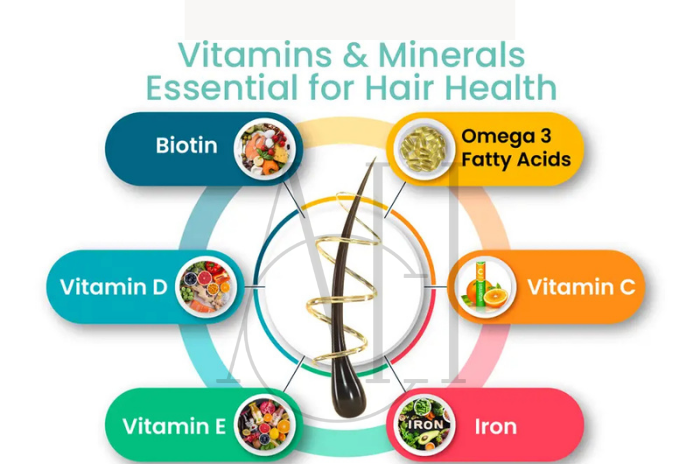
Tips for a Long-Term Hair-Healthy Diet
Sustaining a diet for healthy hair requires long-term strategies that fit into your lifestyle. Consistency is more important than perfection when it comes to nourishing your hair.
Balance Your Meals Every Day
Each meal should include a source of protein, healthy fats, and colorful fruits or vegetables. This approach ensures steady nutrient delivery to hair follicles throughout the day. Planning meals in advance helps maintain consistency in your healthy hair diet.
Hydration for hair health is equally important – aim for adequate water intake daily to support nutrient transport and overall hair health.
Monthly Nutrient Check-Ins
Regularly assessing your diet helps identify potential nutrient gaps. Keep a food diary for a week each month to ensure you’re getting adequate amounts of key nutrients for hair health. This practice helps maintain awareness of your eating patterns.
Consider seasonal adjustments to take advantage of fresh, local produce that provides peak nutrient content for your healthy hair diet.
Combine Diet with Good Hair Care Habits
While nutrition is crucial, combining a healthy hair diet with proper hair care practices maximizes results. Gentle handling, appropriate products for your hair type, and protection from environmental damage all support the benefits of good nutrition.
Regular scalp massage can improve circulation and complement the internal nourishment from your diet for healthy hair.
Why Lean Protein Matters for Hair Growth
Understanding the role of protein for healthy hair helps you make informed choices about protein sources and amounts. Hair is primarily made of protein, making adequate intake essential for growth and strength.
How Keratin Builds Strong Hair
Keratin, the main protein in hair, requires specific amino acids for production. Protein for healthy hair must provide these building blocks consistently. Quality matters as much as quantity – complete proteins that contain all essential amino acids are most beneficial.
The body cannot store protein, so daily intake is necessary to support ongoing hair growth and repair. This makes consistent protein consumption crucial for maintaining healthy hair.
Iron in Lean Meats Helps Scalp Health
Lean meats provide both high-quality protein and easily absorbed iron. This combination is particularly beneficial for people at risk of iron deficiency and hair loss. The heme iron in meat is more readily absorbed than plant-based iron sources.
Choosing lean cuts reduces saturated fat intake while maximizing hair health benefits. This approach supports overall health while targeting specific hair nutrition needs.
Plant Protein: Beans, Lentils, Nuts, Seeds & Tofu
Plant-based protein for healthy hair options offer additional benefits beyond amino acids. Legumes provide iron, zinc, and biotin, while nuts and seeds add vitamin E and healthy fats. These foods support multiple aspects of hair health simultaneously.
For vegetarians and vegans, combining different plant proteins throughout the day ensures complete amino acid profiles necessary for optimal hair growth.
Omega-3 Foods That Nourish Your Hair
Omega-3 fatty acids for hair provide essential nourishment that cannot be produced by the body. These healthy fats support hair growth, add natural shine, and reduce scalp inflammation.
Fatty Fish: Salmon, Herring & Mackerel
Fatty fish provide the most bioavailable forms of omega-3 fatty acids for hair health. These fish also offer high-quality protein and vitamin D, creating a powerful combination for hair growth support.
Regular consumption of fatty fish can improve hair texture, reduce breakage, and support overall scalp health. The anti-inflammatory properties of omega-3s help maintain optimal conditions for hair growth.
Nuts and Seeds: Almonds, Walnuts & Pumpkins
Plant-based sources of omega-3 fatty acids for hair offer convenient options for daily consumption. Walnuts provide alpha-linolenic acid (ALA), while pumpkin seeds add zinc and vitamin E to support hair health.
These foods make excellent snacks and can be easily incorporated into meals. The combination of healthy fats and minerals makes them valuable additions to any healthy hair diet.
Chia, Flax and Hemp: Plant-Based Omega-3
Seeds offer concentrated sources of omega-3 fatty acids for hair health along with other beneficial nutrients. Chia seeds provide protein and minerals, while flaxseeds offer lignans that may support hormonal balance.
Hemp seeds contain all essential amino acids plus omega-3s, making them particularly valuable for plant-based diets. These seeds can be added to smoothies, yogurt, or cereals for easy incorporation.
Vitamins A & C from Fruits and Vegetables
Antioxidant-rich foods for hair provide essential vitamins that support multiple aspects of hair health. Vitamins for hair growth are best obtained from whole food sources that provide additional beneficial compounds.
Leafy Greens: Spinach, Kale for Vitamin A
Dark leafy greens are excellent sources of vitamin A for hair health. Spinach for hair growth provides beta-carotene, iron, and vitamin C in one nutrient-dense package. Kale adds vitamin K and additional antioxidants.
These vegetables support sebum production while providing minerals necessary for hair growth. Their antioxidant-rich profile protects hair follicles from environmental damage.
Berries & Veggies: Vitamin C to Boost Collagen
Berries for hair health offer some of the highest vitamin C concentrations available in whole foods. This vitamin is essential for collagen for hair growth and helps improve iron absorption from plant sources.
Bell peppers, citrus fruits, and strawberries all provide abundant vitamin C along with other antioxidants that protect hair follicles and support healthy growth.
How Antioxidants Protect Hair Follicles
Antioxidant-rich foods for hair neutralize free radicals that can damage hair follicles and interfere with growth cycles. These protective compounds help maintain healthy follicle function and prevent premature aging.
Regular consumption of colorful fruits and vegetables ensures adequate antioxidant intake to support long-term hair health and growth.
FAQ : Healthy Hair Diet for Good Hair Growth Nutrients and Tips
What are the absolute best foods to eat for healthy hair growth?
The best foods for hair growth include eggs, fatty fish, spinach, avocados, nuts, seeds, beans, and berries, which provide essential nutrients like protein, biotin, iron, omega-3 fatty acids, and vitamins A, C, and E.
Which key nutrients are most vital for promoting strong and healthy hair?
The most crucial nutrients are protein for structure, iron to prevent hair loss, biotin for texture, zinc for follicle repair, omega-3 fatty acids for nourishment, and vitamins A, C, D, and E for scalp health and growth support.
Can changing my diet really impact my hair growth and health?
Yes, diet and hair health are closely connected – nutritional deficiencies can cause hair loss and poor hair quality, while a healthy hair diet rich in essential nutrients can significantly improve growth, strength, and appearance.
Are there any specific foods I should avoid if I want to improve my hair health?
Limit high-sugar processed foods, excessive alcohol, and trans fats, as these can increase inflammation, interfere with nutrient absorption, and negatively impact hormone levels that affect hair growth.
How long does it typically take to see results in hair growth after improving my diet?
Hair growth cycles take 3-6 months, so consistent dietary improvements typically show visible results within this timeframe, though some people notice improved hair texture and reduced shedding within 6-8 weeks.
Is it necessary to take supplements for hair growth, or can I get all I need from food?
A well-planned healthy hair diet can provide most essential nutrients for hair growth, though some people may benefit from targeted supplementation for specific deficiencies like iron, vitamin D, or biotin under professional guidance.
What would a sample daily meal plan for optimal hair growth look like?
A best diet for healthy hair includes protein-rich breakfast with eggs and spinach, salmon salad lunch with nuts, lean protein dinner with sweet potatoes and vegetables, plus berries for hair health and nuts as snacks.
Beyond diet, what other habits can I combine with a hair-healthy diet for the best results?
Combine your healthy hair diet with gentle hair care practices, regular scalp massage, adequate sleep, stress management, proper hydration for hair health, and protection from environmental damage for optimal results.


